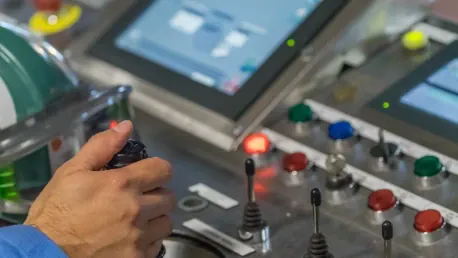The global manufacturing sector is currently witnessing a rapid transformation driven chiefly by advancements in artificial intelligence (AI) and its applications. According to GlobalData’s report “AI in Manufacturing: Startups Driving Factory 4.0,” it is AI-centric startups that are at the forefront of integrating sophisticated technologies into manufacturing processes. This trend includes the utilization of AI-powered collaborative robots (cobots), real-time production simulations, and predictive analytics, all aimed at enhancing automation and sustainability. These innovations promise to revolutionize production processes, reduce waste, and improve operational efficiency, marking a significant shift in how factories operate globally.
AI-Driven Innovations Streamline Manufacturing Processes
Enhancing Operational Efficiency and Reducing Waste
Tejal Hartalkar, a senior disruptive tech analyst at GlobalData, emphasizes that AI-driven technologies are integral to improving various aspects of manufacturing. By leveraging these advanced tools, manufacturers can make more informed decisions, streamline their production processes, and create smarter factory environments. The real game-changers here are startups that provide unique solutions through their innovative products and services. For instance, Vention has developed a cloud-based platform that allows users to design and automate factory equipment seamlessly. This platform not only simplifies the automation process but also drastically reduces the time and cost associated with setting up manufacturing systems.
Bright Machines, another prominent startup, is making waves with its modular micro-factories, which combine robotics with machine learning. These micro-factories are designed for automating assembly processes, presenting a groundbreaking shift from traditional manufacturing practices. The integration of machine learning enables these systems to continually improve their operations based on real-time data, enhancing the overall efficiency and productivity of the manufacturing units. These targeted solutions offered by startups are pivotal in addressing longstanding challenges in the manufacturing sector, not only making factories more efficient but also helping in adopting sustainable practices by minimizing waste and optimizing resource utilization.
Boosting Productivity and Improving Decision-Making
The introduction of AI in manufacturing does not merely stop at automation; it extends to real-time production simulations and predictive analytics, which are crucial for optimizing factory operations. Doxel, a key player utilizing computer vision technology, demonstrates how these advancements can significantly boost productivity and improve project tracking. By employing sophisticated algorithms, Doxel’s systems can analyze large-scale operations, providing accurate insights into productivity metrics and potential bottlenecks. This real-time data is instrumental for factory managers who need to make quick, informed decisions to keep operations running smoothly.
Moreover, predictive analytics allow manufacturers to foresee potential issues before they occur. This preemptive approach is especially valuable for maintenance processes. Startups like Vanti are leveraging AI and machine vision to revolutionize quality control and maintenance. By automating inspections, these technologies can identify defects or irregularities much faster and more accurately than traditional methods. Predictive maintenance driven by AI helps in scheduling timely upkeep, thus avoiding costly downtime and extending the lifespan of machinery. This proactive management not only enhances the reliability of the production line but also significantly cuts down unnecessary repair costs.
The Role of Startups in Driving Factory 4.0
Innovative Solutions for Quality Control and Maintenance
In the realm of quality control and maintenance, AI-driven startups are introducing unprecedented innovations. SmartMore Technology and Vanti are at the forefront of this revolution. By employing AI and machine vision technologies, these companies are automating the inspection processes, ensuring higher accuracy and consistency in quality control. This automation tackles one of the most critical challenges in manufacturing: production bottlenecks. Traditional inspection methods are often time-consuming and prone to human error, which can lead to significant delays in the production line. SmartMore Technology’s solutions are designed to mitigate these issues by providing real-time monitoring and automated analysis, thereby speeding up the entire quality control process.
Predictive maintenance is another area where AI technologies are making a substantial impact. By harnessing the power of AI, Vanti’s systems can predict when a machine is likely to fail based on historical data and real-time monitoring. This predictive capability allows manufacturers to undertake maintenance activities at the optimal time, minimizing unscheduled downtimes and reducing the likelihood of sudden equipment failures. Integrating these advanced solutions into manufacturing workflows ensures that operations are more reliable and efficient, contributing to the sustainability of manufacturing practices.
Addressing Critical Challenges with Advanced Technologies
The broader trend within the manufacturing sector highlights the increasing adoption of AI technologies as essential tools for overcoming traditional challenges. As Tejal Hartalkar points out, these innovations don’t just improve efficiency; they also promote sustainable production practices. With the global focus increasingly shifting towards sustainability, AI-driven solutions are proving instrumental in reducing the environmental impact of manufacturing processes. They enable factories to optimize resource utilization, lower energy consumption, and minimize waste, aligning with broader environmental goals.
Startups are playing a crucial role in driving this transformation by continuously developing and implementing advanced technologies that push the boundaries of traditional manufacturing. Their contributions are reshaping the industry landscape, making it more adaptable and resilient to future challenges. AI-driven solutions are not only about automating tasks but also about creating smarter, more sustainable factory environments. These advancements signify a new era where technology and sustainable practices go hand-in-hand, paving the way for the next generation of manufacturing.
A New Era of Manufacturing Innovation
Transforming Factories into Smarter, Sustainable Entities
The overarching trend identified in modern manufacturing is the increasing reliance on AI technologies to address longstanding operational challenges. These technologies are not just enhancing efficiency but are also pivotal in driving sustainability. As Hartalkar notes, AI solutions are integral to promoting smarter factories that are more adaptable to future needs. By integrating AI into various stages of production, manufacturers are able to create intelligent systems that can self-optimize, making real-time adjustments to improve productivity and reduce waste.
This shift towards Factory 4.0 is indicative of a broader industry trend focused on leveraging cutting-edge technology to revolutionize traditional manufacturing practices. The integration of AI is fundamentally changing how factories operate, making them smarter and better equipped to handle complex production demands. This transformation is not just about robots and automation; it’s about creating a holistic approach to manufacturing where every process is optimized for efficiency and sustainability.
The Role of AI in Future Manufacturing Landscapes
The global manufacturing sector is undergoing a significant transformation, primarily fueled by advancements in artificial intelligence (AI) and its myriad applications. According to the report “AI in Manufacturing: Startups Driving Factory 4.0” by GlobalData, AI-driven startups are leading the charge in incorporating advanced technologies into manufacturing operations. These developments include the use of AI-powered collaborative robots, known as cobots, real-time production simulations, and predictive analytics. These innovations aim to enhance automation and sustainability across the industry. The implementation of these technologies holds the promise of revolutionizing production processes by making them more efficient and reducing waste, thus improving overall operational effectiveness. This evolution signifies a noteworthy shift in the way factories across the globe operate, underlining the critical role of AI in the future of manufacturing. As these AI applications continue to develop and mature, they not only contribute to higher efficiency and productivity but also foster a culture of continuous improvement and adaptability in a rapidly changing industrial landscape.









